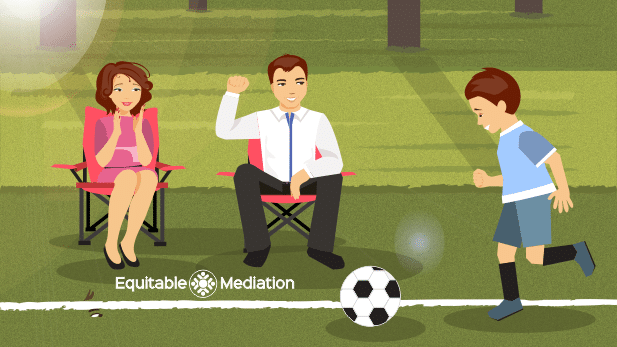For divorcing couples without kids, their relationship can come to an end after the divorce is final.
Their property and debts have already been divided, alimony has been settled and other than perhaps a monthly check sent from one spouse to another, interaction between the parties can be virtually non-existent.
But if you're divorcing with kids, it's an entirely different story.
Because after your divorce is finalized, you'll still need to interact on a regular basis with your ex-spouse. Not as husband and wife, but as co-parents to your children.
So what can you do to minimize the negative impacts of your divorce on your kids so they can grow up happy, supported and well-adjusted?
Our panel of experts weighed in and shared some co parenting tips for divorcing and divorced parents.
Read what they have to say...
What are some co parenting tips when going through a divorce with children?

Laura Alper, MSW, LCSW
"Parents need to arrive at parenting decisions together and support those decisions. They need to conference with each other when they have concerns or when concerns arise.
They should never speak badly about the other parent to the child or children.
And they should try and craft a cooperative parenting process, so that each parent feels supported and not threatened by the other parent’s parenting style when the children are not with them."

Dr. Pamela Brand, Psy.D., LMFT
"I encourage couples to try to set up meetings so that they can speak regularly - maybe once or twice a week or as often as is practical.
These meetings are for the purpose of scheduling and making decisions regarding children so if a child has a school event or a doctor’s appointment, both parents can be involved, which is optimal.
These should not be last-minute notifications so it's important to have check-ins over the phone when possible or over e-mail if not.
Every Sunday in the beginning of the week or whenever makes sense.
It is also important to be flexible with the visitation agreement.
Since schedules are subject to change, when parents can be open and flexible, it always makes things easier, e.g. if one parent has to go out of town and can give the other parent notification as soon as possible, and there’s an openness to the child care schedule’s changing – they can support each other."
Joint Parenting Requires Two Healthy Co-Parents
 Mihaela Campion, MA, LCPC
Mihaela Campion, MA, LCPC
"A successful co parenting relationship means having the child’s emotional needs met. In order to do that, each co-parent has a responsibility to acknowledge and take care of their own needs as well.
A divorced or separated parent needs to give themselves permission to grieve and take care of themselves during the healing process.
That will enhance their ability to take care of their children’s needs.
Using divorce mediation to get the actual divorce helps set a good foundation for co-parenting, too. Because getting help with structuring the parenting plan and adjusting to the new parenting arrangement benefits everyone."
To learn more about Mihaela Campion, visit: Revival Therapy

Irene Schreiner, LMFT
"Whether you are married or divorced, it is important to approach parenting your children as a team. And clear communication and common goals are key to being a good team.
I recommend that parents identify and agree upon 5-10 important rules that will be followed in both households at all times.
Beyond those rules, maintain open communication, but know that there will be more flexibility and variations with how other things are handled.
Make sure not to talk negatively about your ex-spouse to your kids.
Do your best to show respect towards each other in all interactions. Keep your kids out of the middle of your conflict.
Finally, work through any residual personal relationship issues so that they don’t flow over and impact your children."
Successful Co Parenting Starts with a Parenting Plan

Kate Engler, LMFT, LPC
"Create a custody plan (and stick with it).
Make sure it includes (at a minimum): a vision for what an ideal co parenting relationship 'looks like,' opportunities for regularly scheduled 'check-ins' about how things are going, and built-in flexibility for adjustments based kids’ changing needs.
Accept imperfection.
Parenting is an imperfect process and co-parenting is no different. Accepting flaws and mistakes in yourself and the other person makes it easier to let small things go and focus on the big picture.
Respect the relationship the other person has with your kids. Children do well to have a positive relationship with both parents.
If you bad mouth the other parent or devalue his/her relationship with your child in any way (e.g., assume it’s not good because he/she doesn’t interact with your child the same way you do), you risk harming the bond with that parent and, in turn, hurting your child."
Good Communication Between Co-Parents is Key - Especially if There are Different Parenting Styles

David Klow, LMFT
"The co-parenting that I’ve seen work is where parents communicate well with each other.
They don’t triangulate the child; they don’t run their unprocessed stuff that they haven’t resolved with one another through the interactions with the child so the child is stuck in the middle.
Obviously being very careful about how you talk about the other parent so that any feelings towards your spouse don’t get transferred over to the child as best you can.
And really trying to provide some consistency because you don’t want to make your co-parenting situation a battleground."

Joe Dillon, MBA
"Difficulty communicating is common for couples who divorce. But communication is more important than ever for a good co-parenting relationship.
To keep each other appraised of your kids’ activities, homework, doctor’s appointments, etc., leverage technology by using a shared online calendar or co parenting app and place the children’s activities, schoolwork due, etc. on it.
This way, you can each access it from your computer or phone and be fully informed of the kids' schedules.
And while they may not like to admit it, kids thrive on routine.
So if you're divorcing with young kids, be sure to keep things consistent as the kids move from mom's house to dad's house. Simple things such as enforcing the same bedtime to keeping similar routines such as homework first before TV, etc. can go a long way towards avoiding arguments about differing parenting styles.
Keeping a unified front at both houses to provide a consistent parenting experience while eliminating the age old argument of, 'Why can't I stay out until midnight? I can when I'm at mom's / dad's house!' Kids are very good at figuring out who's the softie and who's the disciplinarian!
Be open to flexibility in your co-parent’s schedule because there will be times you'll require the same flexibility and understanding.
Your kids deserve to have both of you actively involved in their lives and at the end of the day, you are still both responsible for raising your children. Your marital status shouldn’t impact that in the least.
And if you need help, don’t be afraid to seek it out.
There are many resources available to teach you tools and strategies to improve your co-parenting skills including therapists, parenting coaches, clergy, books, etc.
If you love your children more than you dislike your difficult ex, you’ll put their needs first and make parenting decisions that support that."

Cheryl Dillon, CPC
"Learning how to cope with divorce in general can be a challenge. After all, we're not given a handbook that tells us how to feel or what to do to make the experience go smoothly.
When you add kids into the mix, the situation gets even more complicated.
The good news is, while your divorce will most certainly have an impact on your children's life, there are some things that you can do to minimize the effects and make the experience as positive as possible for your little ones.
Here are a few simple do’s and don’ts when it comes to co-parenting your children during divorce (and after you're divorced):
- Don't try to get your kids to pick sides.
Parental Alienation Syndrome is real and if you try to come between your kids and their other parent, it’s you they'll grow to resent someday.
As difficult as it may be, fostering positivity in your children's relationship with their other parent will go a long way toward helping them cope with your divorce.
- Don't talk badly about your ex to or in front of your children.
As difficult as it may be, make a conscious effort to point out the good things about your former spouse.
Your kids will thank you one day.
- Don't speak negatively about your ex’s family.
You may not like your former spouse’s parents or siblings, but your children likely have a close relationship with their relatives.
Don’t stand in the way of that.
- Do stay focused on what’s most important at all times – your love for your kids.
This will help you to pick your battles and handle interactions with your ex-spouse more amicably.
It will also provide a positive example of how to deal with divorce that your kids can learn from.
- Do put your kids first by mediating your divorce.
If you and your husband or wife have not yet started your divorce proceedings, now is the time to learn more about mediating your divorce.
The divorce method you use and the way you handle yourself during the process will impact your future co parenting arrangement.
Your kids deserve to have both of you involved in their lives and mediation is the best way to create a framework for that to occur.
- Do assure your child that the divorce was not their fault.
Children have an uncanny way of blaming themselves for things that are completely out of their control. Don’t allow your child to carry unfounded guilt!
Start a conversation and tell them as many times as necessary until they feel reassured.
- Do remind your children...
that even though you’re no longer together, you’re both still parents and that you will both continue to love and support them, no matter what.
- Don't assume you know how your kids are feeling.
Just because they haven’t spoken up or expressed their emotions about the divorce, doesn’t mean they’ve magically adjusted.
Open a dialogue and let your kids know that they can come to you whenever they need to talk.
Remember, you may no longer be husband and wife but you'll always be Mom and Dad!
And hopefully these tips can help ensure you have not only an effective co parenting plan or joint custody arrangement, but a healthy relationship with your children!
Other Useful Resources:




 Mihaela Campion, MA, LCPC
Mihaela Campion, MA, LCPC




